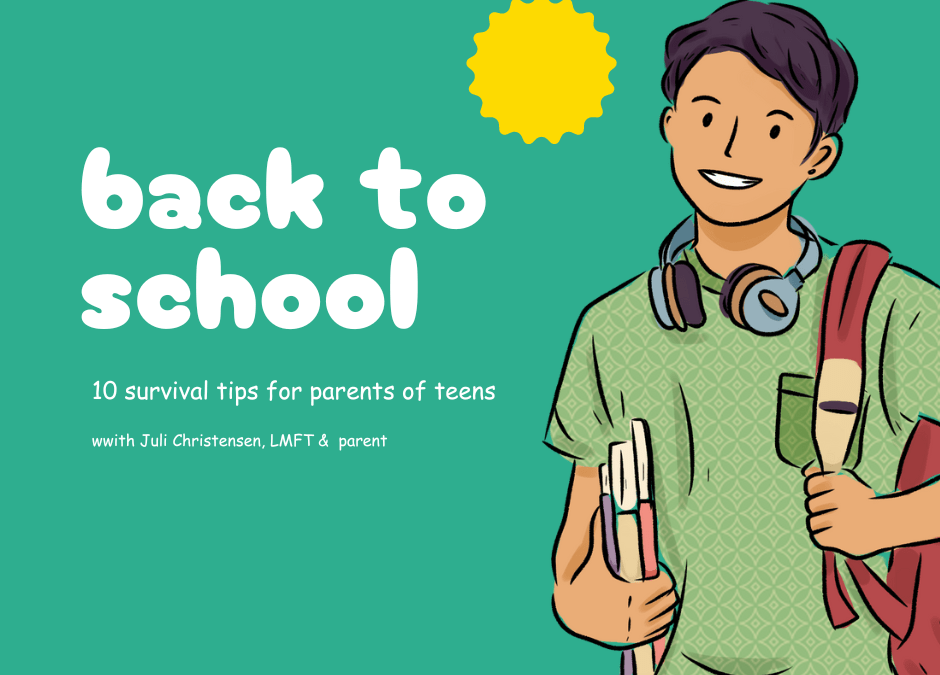 Ah, back to school with teenagers. If you’ve ever found yourself staring wistfully at your toddler’s old sippy cup, reminiscing about the days when your biggest challenge was finding a matching pair of shoes, I feel you. As a Marriage and Family Therapist and mom of 13 kids—most of whom have survived their teenage years, with a few still deep in the trenches—I’ve learned a thing or two about navigating this wild ride.
Ah, back to school with teenagers. If you’ve ever found yourself staring wistfully at your toddler’s old sippy cup, reminiscing about the days when your biggest challenge was finding a matching pair of shoes, I feel you. As a Marriage and Family Therapist and mom of 13 kids—most of whom have survived their teenage years, with a few still deep in the trenches—I’ve learned a thing or two about navigating this wild ride.
So here’s some hard-earned advice for surviving the back-to-school whirlwind when you’ve got teenagers.
1. Limit Phone Usage Without Starting World War III
Let’s start with the big one—phones. Teens and their phones are practically surgically attached, and while it’s tempting to just throw the thing out the window, that’s probably not the best strategy. Instead, set clearboundaries. Establish phone-free zones, like at the dinner table or during homework time. And consider having them turn them in at bedtime. It’s easier to get a good night’s sleep without the temptation to chat all night. Remember, we are helping them establish good habits. Balance is key here—let them have their digital space, but make sure they know there’s more to life than what’s happening on Snapchat.
The research out there about the link between teen phone use and anxiety is pretty sobering. I saw this effectfirst hand this summer with my youngest who is starting high school. There was a sort of Jekyll and Hyde type of phenomenon going on with her.
When she spent countless hours on her phone, her anxiety spiked, she was irritable and confrontational,and way more concerned with how she was seen. Unfortunately (or fortunately) her phone had a little accident and she had to spend several weeks without it. Low and behold, her sweet little self came out of hiding. She was even able to see the huge change and commented that she felt calmer and more at peace without her phone. She was happier and healthier too.
This just goes to show that placing restrictions on phone usages isn’t us being overbearing and out of touch,it is allowing our kiddos some protection and space to grow and be who they truly are without the anxiety of the social media spotlight.
2. Establish and Maintain a Routine
Even though teens will roll their eyes at the word “routine,” they need it just as much as the little ones do—maybe even more. Set regular bedtimes, wake-up times, and homework times, and stick to them. Sure, there will be grumbling, but deep down (like way deep down), they crave the stability a routine provides. It helps them manage their time and sets them upfor success, both academically and in life. Plus, it keeps you from turning into a full-time nagging machine. But here’s the thing—don’t make it too rigid.
Teens are like cats; they need structure, but they also need to feel like they’re the ones in control. So, build flexibility into the routine. Give them some say in how they spend their time, and you might be surprised athow much more willing they are to stick to the plan.
3. Transportation and Driving Safety: You Can Survive It
The day your teen gets their driver’s license is both terrifying and liberating. Suddenly, they have the freedom to go places without you, and you have the freedom to stop playing chauffeur. But let’s be real—there’s a lot toworry about when they’re behind the wheel. Have an open and honest conversation about the responsibilities of driving, set clear rules (like no texting and driving, and a reasonable curfew), and make sure they understand the consequences of breaking those rules. Talk to them about what to do in emergencies and come up with some contingency plans for when things don’t go according to plan. Consider using apps that track their driving habits, but also trust that you’ve taught them well.
Years ago one of my kiddos went to a concert with some friends in LA. They drove up and parked in one ofthose gated parking lots. After the concert they came back to find the gate locked and the attendant gone (even though the lot wasn’t supposed to be closed). It was late and they were stuck. Thankfully we had worked out an emergency plan with our son. He gave us a call and they were able to get to a safe place for the night and get the car in the morning.
4. Tracking Active Kiddos on the Go
Teens are always on the move—school, sports, friends’ houses, work. Keeping track of them can feel like a full-time job. Thankfully, technology can help (when it’s not driving us crazy). There are plenty of family tracking apps that can give you peace of mind without feeling like you’re hovering. Set them up with your teens’ knowledge, not as a secret spy mission, and make it clear that it’s about safety, not control. It’s a fine line between being involved and being overbearing, but with a little communication, you can walk it.
5. Realistic Expectations: Embrace the Absence
One of the biggest adjustments with teens is accepting that they’re not around as much. Their social lives are booming, and suddenly, the house is quieter than you remember. It’s normal to miss them, but it’s also important to give them the space they need to grow. When they do surface for air, make the most of that time. Share a meal, ask about their day, and then let them go back to doing their thing. Accept that you won’t always be their first priority—and that’s okay. It means you’re doing your job of raising independent adults.
6. Know Their Friends (and Maybe Their Friends’ Parents)
Teens might not love it when you ask about their friends, but it’s important to know who they’re spending time with. Encourage them to bring friends over, even if it means stocking up on snacks and enduring loud music. The more you know about their social circle, the better equipped you’ll be to guide them through any issuesthat come up. And don’t be shy about introducing yourself to the other parents—it takes a village, after all.
7. Weekly Drug Tests: Safety Check and Peer Pressure Shield
Now, this might seem a bit extreme to some, but hear me out. I’m a big believer in weekly drug tests—thosesimple pee tests you can snag off Amazon that check for THC and nicotine. Not only do these give you some peace of mind, but they also arm your teen with a built-in excuse when they’re facing peer pressure. Make it clear to your kids that these tests aren’t about mistrust; they’re about protection. And once you start, stick to it—consistency is key. Trust me, this little routine can be a game-changer for everyone’s peace of mind.
The fact is vape use is very common for teens. This starts in middle school and continues throughout high school. And it can have a huge impact on mental health, academics, health, and social life. Having navigated this world with my 13, being the “strict parent” provides my kids with an easy way to navigate the peer pressure and temptation. They might roll their eyes and groan about it, but they actually get a sense of comfort and protection from knowing we care.
8, Keep an Eye on Grades and Attendance—But Don’t Rely Solely on the Apps
One of the best tools for staying in the loop with your teen’s school life is the parent apps many schoolsprovide. These apps let you check on attendance, grades, and even assignments, giving you a heads-up ifyour teen starts slipping in a subject. But here’s a little secret: kids know how to work the system. Just because they say they turned in a missing assignment and the teacher hasn’t graded it yet, doesn’t alwaysmean that’s the case. And to be honest, sometimes teachers aren’t the best at updating the system either. So use the app as a guide, but don’t forget to check in with teachers directly if something seems off. It’s easier to catch a problem early than to try and fix it after it’s spiraled out of control.
9. Help Them Manage Stress and Anxiety
Teens today are under a lot of pressure—academically, socially, and athletically. It’s tough to see your kids stressed out, but it’s even tougher for them to navigate it alone. Make sure they know it’s okay to not be perfect. Encourage them to talk about what’s stressing them out, and listen without immediately jumping intofix-it mode. Sometimes, they just need to vent. Help them prioritize their commitments, and remind them thatit’s okay to say no to things that are too much. If their stress seems overwhelming, don’t hesitate to bring in a professional—sometimes an outside perspective can make all the difference.
10. Celebrate the Moments—Big and Small
It’s easy to get caught up in the stress and challenges of raising teens, but don’t forget to celebrate the good stuff. Did they pass that tough test? Celebrate! Did they make a smart decision on their own? Highfive! These little moments of success are what keep them motivated and remind you that all the hard work is paying off.
Back to school with teens can feel like a marathon, but remember, you’re not running it alone. Stayconnected, stay patient, and don’t forget to laugh (because if you don’t, you might cry). And always remember—you’re doing a great job, even when it feels like you’re just winging it.
Now, I’m off to make sure my last high schooler actually did their homework instead of just saying they did. Wish me luck!
For more information about Juli Christensen, or to make an appointment to see her, click HERE.

